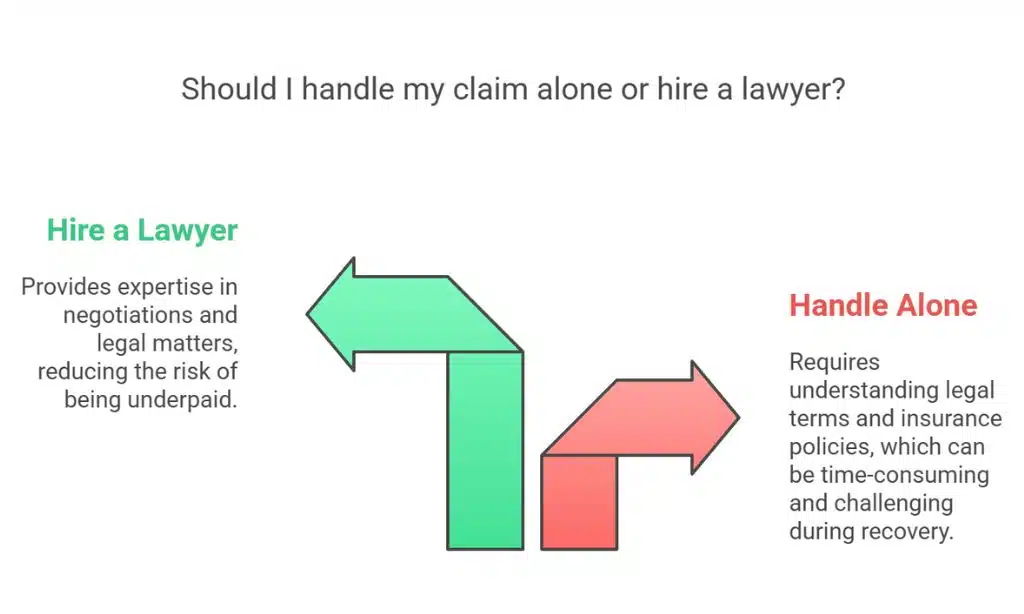Metairie locals know that life can shift in an instant—especially after an unexpected accident. One moment, you’re heading home from work, and the next, you’re staring at medical bills, lost wages, and an overwhelming list of decisions. For many, one question stands out: should you hire a lawyer or try to handle the claim yourself? It’s not a simple yes or no.
The answer depends on how serious the injuries are, how clear the fault is, and how prepared you feel to go up against an insurance company that does this every day. Some cases might be straightforward enough to manage solo—but others can spiral quickly without legal support. That’s why many folks turn to experienced professionals like Poolson Oden injury lawyers to help make sense of their options and level the playing field.
Understanding Personal Injury Claims
Personal injury claims are made when an individual gets injured as a result of someone else’s negligence or wrongful act. These types of claims include everything from car accidents to slip-and-fall accidents. You need compensation for medical bills, lost wages, and other damages. To better understand the complexities of these cases, you must know legal principles, groups of evidence, and negotiation techniques.
Benefits of Hiring a Personal Injury Lawyer
There are several benefits of hiring an attorney for personal injury cases. Attorneys know the law, and they will ensure that every detail of a claim complies with the law. They have done the necessary work to know the ins and outs of evidence collection, evidence presentation, insurance negotiations, and fair compensation advocacy. Settlement offers are larger when an attorney is in the mix since they know the actual value of the claim.
Struggle of Settling
However, handling a personal injury claim without assistance can be challenging. A person has to become literate in legalese, coverage, and bargaining. This requires hours, days, and weeks of work, which can be too much in recovery.
Secondly, insurance companies are often motivated to reduce the money they pay out and use strategies that may be detrimental to the uninitiated. It also means that when you go solo, there’s a higher chance of being underpaid.
Factors to Consider
Many factors must be considered when deciding whether to seek legal representation or to settle by yourself. What matters most is the severity of the injury. Getting the right compensation for complicated or severe injuries may require legal experience. Another factor in the decision is the clarity of liability. If proving fault is clear-cut (and undisputed), you might be able to manage the claim on your own.
However, if either party disputes fault, legal representation is necessary. You need to assess the ability to gather evidence and negotiate. If you are confident in your abilities, you may choose to represent yourself, but if you have limited experience in these things, you should seek the help of a professional. Also, the resources spent on the process need to be weighed since carrying out a claim without a lawyer means making a great time investment.
Relevant Decision-Making Skills
In the end, hiring a personal injury lawyer or settling yourself depends on the specifics of your situation. If your feelings about the legal process are overwhelming, you may benefit from professional guidance. Alternatively, those certain that they can deal with the system may decide to take things into their own hands.
Whichever path you choose, diligent research and assessment are necessary. When in doubt, approaching a legal professional can be helpful. Many treatment providers offer free initial consultations, allowing you to explore your options without cost. This would help you understand the worth and complexity of your case, hence helping you with the decision-making process.
Takeaways
There are many factors to consider when deciding whether to hire a personal injury lawyer or settle without one. Each offers its own set of advantages and drawbacks. The decision lies with you, your comfort with the method, and the complexity of the claim. Balancing these considerations helps the individual make the best decision to fulfill the needs of their specific circumstance and receive fair compensation along with peace of mind after the accident.






































